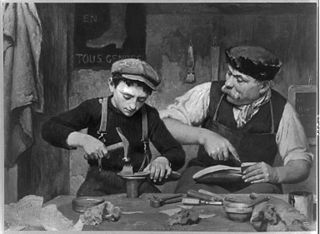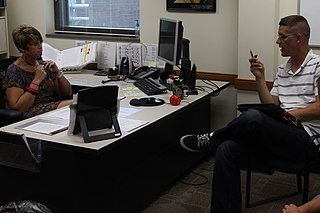
Apprenticeship is a system for training a new generation of practitioners of a trade or profession with on-the-job training and often some accompanying study. Apprenticeships can also enable practitioners to gain a license to practice in a regulated occupation. Most of their training is done while working for an employer who helps the apprentices learn their trade or profession, in exchange for their continued labor for an agreed period after they have achieved measurable competencies.
Further education in the United Kingdom and Ireland is additional education to that received at secondary school that is distinct from the higher education (HE) offered in universities and other academic institutions. It may be at any level in compulsory secondary education, from entry to higher level qualifications such as awards, certificates, diplomas and other vocational, competency-based qualifications through awarding organisations including City and Guilds, Edexcel (BTEC) and OCR. FE colleges may also offer HE qualifications such as HNC, HND, foundation degree or PGCE. The colleges are also a large service provider for apprenticeships where most of the training takes place at the apprentices' workplace, supplemented with day release into college.
The Gabriel Dumont Institute (GDI), formally the Gabriel Dumont Institute of Native Studies and Applied Research Inc., is a non-profit corporation serving the educational and cultural needs of the Saskatchewan Métis and Non-Status Indian community, and is the officially-designated education arm of the Métis Nation—Saskatchewan (MN-S).

The CNIB Foundation is a Canadian charitable organization and volunteer agency dedicated to assisting Canadians who are blind or living with vision loss, and to provide information about vision health for all Canadians. Founded in 1918 as the Canadian National Institute for the Blind to assist soldiers who had been blinded in the First World War, CNIB originally offered sheltered care and specialized employment to people with vision loss. It has since expanded to include other programs and services, including research, public education, rehabilitation counselling and training, advocacy and an alternative-format library for people living with a print disability. It is a member of the Braille Authority of North America.
TAFE NSW is an Australian vocational education and training provider. Annually, the network trains over 500,000 students in campus, workplace, online, or distance education methods of education. It was established as an independent statutory body under the TAFE Commission Act 1990. The Minister for Regional Development, Skills and Small Business is responsible for TAFE NSW.

Minnesota Independence College and Community (MICC) is a 501(c)3 nonprofit vocational and life skills training program for autistic and neurodivergent young adults. Since their founding in 1996 (formerly Minnesota Life College), MICC has remained dedicated to helping participants make successful transitions towards independent living and self-sufficiency.

Rehabilitation counseling is focused on helping people who have disabilities achieve their personal, career, and independent living goals through a counseling process.

The Technical Education and Skills Development Authority serves as the Philippines' Technical Vocational Education and Training (TVET) authority. As a government agency, TESDA is tasked to both manage and supervise the Philippines' Technical Education and Skills Development (TESD). Its goals are to develop the Filipino workforce with "world-class competence and positive work values" and to provide quality technical-educational and skills development through its direction, policies, and programs.

Career counseling is a type of advice-giving and support provided by career counselors to their clients, to help the clients manage their journey through life, learning and work changes (career). This includes career exploration, making career choices, managing career changes, lifelong career development and dealing with other career-related issues. There is no agreed definition of the role of a career or employment counsellor worldwide, mainly due to conceptual, cultural and linguistic differences. However, the terminology of 'career counseling' typically denotes a professional intervention which is conducted either one-on-one or in a small group. Career counseling is related to other types of counseling. What unites all types of professional counseling is the role of practitioners, who combine giving advice on their topic of expertise with counseling techniques that support clients in making complex decisions and facing difficult situations.
The Polish American Association (PAA) is a non-profit human services agency that serves the diverse needs of the Chicago immigrant community.
Dale Rogers Training Center (DRTC), a non-profit organization, is the oldest and largest community vocational training and employment center for individuals with disabilities in Oklahoma. With five locations in Oklahoma, Dale Rogers Training Center trains or employs 1100 people a year: more than 900 with disabilities.
Supported employment refers to service provisions wherein people with disabilities, including intellectual disabilities, mental health, and traumatic brain injury, among others, are assisted with obtaining and maintaining employment. Supported employment is considered to be one form of employment in which wages are expected, together with benefits from an employer in a competitive workplace, though some versions refer to disability agency paid employment. Companies such as Skilcraft in the United States are an example of "supported employment" which is defined in law for state and federal reimbursements.
AbleLight, formerly known as Bethesda Lutheran Communities, is a non-profit human service organization serving people with intellectual and developmental disabilities through faith-based programs. Bethesda, a 501(c)3 non-profit, provides supports and services for more than 2,000 people with intellectual and developmental disabilities and their families in 11 states including California, Colorado, Illinois, Kansas, Michigan, Minnesota, Missouri, New Jersey, Oregon, Washington, and Wisconsin. The organization is headquartered in Watertown, Wisconsin.
Fedcap Rehabilitation Services, Inc., or Fedcap, is a Manhattan-based non-profit organization that provides vocational training and employment resources to those who face problems with disabilities and employment-related problems.

The Texas Workforce Commission (TWC) is a governmental agency in the U.S. state of Texas that provides unemployment benefits and services related to employment to eligible individuals and businesses.

Friends-International (FI) is an international social enterprise and registered non-governmental organization focusing on children's empowerment established in Cambodia in 1994. Its mission is "to build a future where all children are safe from all forms of abuse, are able to become productive citizens of their countries and contribute to a more equitable and sustainable world." FI works in Cambodia, Indonesia, Laos, Thailand and with almost 50 partners around the world, providing social services to marginalized urban young people and their families.
Henshaws Society for Blind People is a specialist charity providing support, advice and training to anyone affected by sight loss and other disabilities.
California Autism Foundation (CAF) is a 501(c)(3) non-profit organization headquartered in Richmond, California.
Polytechnic schools in Japan are vocational education institutions for short and long term programs, a group of public human resources development facilities under paragraph (1) (i) of Article 15-6 of the Human Resources Development Promotion Law. It involves designated private sector as well.
Opportunities Industrialization Center is a nonprofit adult education and job training organization headquartered in Philadelphia, Pennsylvania, with offices located in New Haven, Connecticut, Washington, D.C., and Burma Camp, Accra, Ghana.








